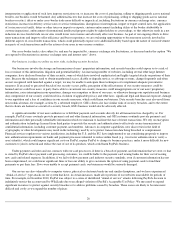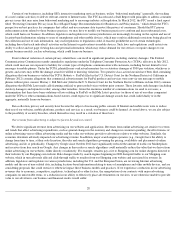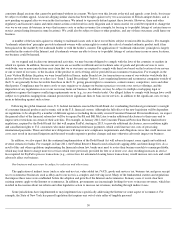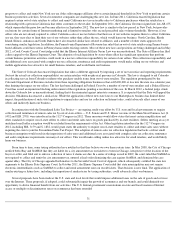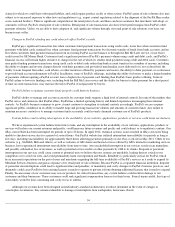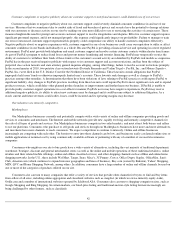eBay 2012 Annual Report Download - page 37
Download and view the complete annual report
Please find page 37 of the 2012 eBay annual report below. You can navigate through the pages in the report by either clicking on the pages listed below, or by using the keyword search tool below to find specific information within the annual report.
fires, power loss, telecommunication failures, terrorist attacks, cyber attacks, computer viruses, computer denial-of-service attacks, human error,
hardware or software defects or malfunctions (including defects or malfunctions of components of our systems that are supplied by third-party
service providers), and similar events or disruptions. Some of our systems, including our Shopping.com website and the systems related to the
Bill Me Later business, are not fully redundant, and our disaster recovery planning is not sufficient for all eventualities. Our systems are also
subject to break-ins, sabotage, and intentional acts of vandalism. Despite any precautions we may take, the occurrence of a natural disaster, a
decision by any of our third-party hosting providers to close a facility we use without adequate notice for financial or other reasons, or other
unanticipated problems at our hosting facilities could cause system interruptions and delays, and result in loss of critical data and lengthy
interruptions in our services. We do not carry business interruption insurance sufficient to compensate us for losses that may result from
interruptions in our service as a result of system failures.
If we are unable to cost-effectively upgrade and expand our websites, services and platforms, our business would suffer.
We must constantly add new hardware, update software and add new engineering personnel to accommodate the increased use of our
websites and platforms, and the new products and features we regularly introduce. As our PayPal business continues to grow and expand both in
terms of geographies and product offerings (e.g., PayPal's retail point of sale solutions), we are focused on updating our PayPal platform to
provide increased scale, improved performance and additional built-in functionality addressing regulatory compliance matters (e.g., anti-money
laundering and terrorist financing). This upgrade process is expensive and time-
consuming, and the increased complexity of our websites and the
need to support multiple platforms as our portfolio of brands grows increases the cost of additional enhancements. Failure to upgrade our
technology, features, transaction processing systems, security infrastructure, or network infrastructure in a timely and cost-effective manner to
accommodate increased traffic or transaction volume or changes to our site functionality could harm our business. Adverse consequences could
include unanticipated system disruptions, slower response times, degradation in levels of customer support, impaired quality of users'
experiences of our services, impaired quality of services for third-party application developers using our externally accessible application
programming interfaces and delays in reporting accurate financial information, and could result in customer dissatisfaction and the loss of
existing users on our websites. We may be unable to effectively upgrade and expand our systems in a timely manner or smoothly integrate any
newly developed or purchased technologies or businesses with our existing systems, and any failure to do so could result in problems on our
sites. Further, steps to increase the reliability and redundancy of our systems are expensive, could reduce our margins and may not be successful
in reducing the frequency or duration of unscheduled downtime.
Risks associated with our ongoing efforts to enhance and unbundle the components of GSI's ecommerce and payments platform and to
migrate GSI's existing customers to its new platform are discussed in more detail under the caption “If our GSI business is unable to enhance its
platform and migrate clients to its new platform in a timely and cost-effective manner, it would be substantially harmed” above.
There are many risks associated with our international operations.
Our international expansion has been rapid and our international business, especially in Germany, the U.K. and Korea, has also become
critical to our revenues and profits. Net revenues outside the U.S. accounted for approximately 52% and 53% of our net revenues in the years
ended December 31, 2012 and 2011, respectively.
Expansion into international markets, such as our entry into Turkey in May 2011 upon the completion of our acquisition of additional
shares in GittiGidiyor and PayPal's entry into emerging markets, is an increasing focus of our business. Geographical expansion requires
significant management attention and resources and requires us to localize our services to conform to local cultures, laws, regulations, standards,
policies and practices. The commercial, financial, Internet, and transportation infrastructure in developing countries may make it more difficult
for us to replicate our business models. Some of these developing countries may have legal regimes in which the application of laws and
regulations in the online or mobile context is subject to greater uncertainty, as well as a higher incidence of corruption and fraudulent or
unethical business practices, than countries in which we are historically accustomed to operating. In many countries, we compete with local
companies that understand the local market better than we do, and we may not benefit from first-to-market advantages. We may not be
successful in expanding into particular international markets or in generating revenues from foreign operations. For example, in 2002 we
withdrew our eBay marketplace offering from the Japanese market. In 2007, we contributed our business in China to a joint venture with a local
Chinese company; we terminated this joint venture in 2012. Even if we are successful in developing new markets, we often expect the costs of
operating new sites to exceed our net revenues from those sites for at least 12 months in most countries.
35



